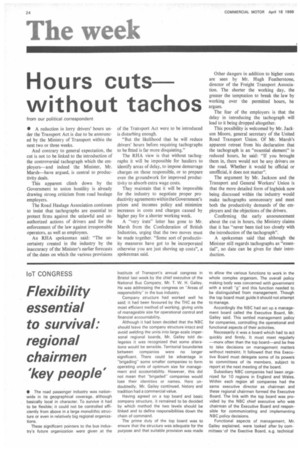Hours cuts without tachos
Page 26

If you've noticed an error in this article please click here to report it so we can fix it.
from our political .correspondent • A reduction in lorry drivers' hours under the Transport Act is due to be announced by the Ministry of Transport within the next two or three weeks.
And contrary to general expectation, the cut is not to be linked to the introduction of the controversial tachograph which the employers—and indeed the Minister, Mr. Marsh—have argued, is central to productivity deals.
This apparent climb down by the Government to union hostility is already drawing strong criticism from road haulage employers.
The Road Haulage Association continues to insist that tachographs are essential to protect firms against the unlawful and unauthorized actions of drivers and for the enforcement of the law against irresponsible operators, as well as employees.
An RHA spokesman said: "The uncertainty created in the industry by the inaccuracy of the Minister's earlier forecasts of the dates on which the various provisions of the Transport Act were to be introduced is disturbing enough.
"But the likelihood that he will reduce drivers' hours before requiring tachographs to be fitted is far more disquieting."
The RHA view is that without tachographs it will be impossible for hauliers to identify areas of delay, to impose demurrage charges on those responsible, or to prepare even the groundwork for improved productivity to absorb extra wage costs.
They maintain that it will be impossible for the industry to negotiate proper productivity agreements within the Government's prices and incomes policy and minimize increases in costs and charges caused by higher pay for a Shorter working week.
A "very irate" letter has gone to Mr. Marsh from the Confederation of British Industries, urging that the two moves must be made together. "Some sort of productivity measures have got to be incorporated otherwise you are just shoving up costs", a spokesman said. Other dangers in addition to higher costs are seen by Mr. Hugh Featherstone, director of the Freight Transport Association. The shorter the working day, the greater the temptation to break the law by working over the permitted hours, he argues.
The fear of the employers is that the delay in introducing the tachograph will lead to it being dropped altogether.
This possibility is welcomed by Mr. Jackson Moore, general secretary of the United Road Transport Union. Of Mr. Marsh's apparent retreat from his declaration that the tachograph is an "essential element" in reduced hours, he said: "If you brought them in, there would not be any drivers on the road. Whether it would be official or unofficial, it does not matter".
The argument by Mr. Jackson and the Transport and General Workers' Union is that the more detailed form of logbook now being discussed within the industry would make tachographs unnecessary and meet both the productivity demands of the employers and the objections of the drivers.
Confirming the early announcement about the cut in hours, the Ministry claims that it has "never been tied too closely with the introduction of the tachograph".
A spokesman said that although the Minister still regards tachographs as "essential", no date can be given for their introduction.
































































































































